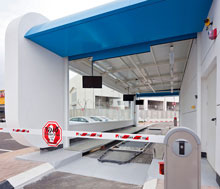Israel to Get Electric Car Battery Swap Stations
Next month, Better Place, a startup based in California, will begin selling electric cars in Israel that come with subscription packages that include a leased battery and the cost of recharging it. Gasoline is expensive and taxes on gas-powered cars are high in Israel, and the company says the packages could make owning an electric car 20 percent cheaper than owning a gasoline-powered car.

Better Place is trying to solve the biggest challenge to the widespread adoption of electric cars: the limitations imposed by battery chemistry. A battery big enough to give an electric car the same range as the average gas car would be far too large and expensive; and recharging battery packs takes hours at standard outlets, compared to the minutes it takes to refuel a conventional car.
Better Place will sell a new electric sedan made by Renault that has a range of just over 100 miles on a charge—enough for most daily commutes. For longer trips, Better Place provides battery swap stations, where an automated system switches out a depleted battery for a fully-charged one in less than five minutes. Instead of owning the batteries, the car owners buy subscriptions for a certain number of kilometers of driving per year. They can choose from several plans, much the same way mobile phone owners subscribe to minutes.
The size of Israel limits the number of swap stations needed. What’s more, high taxes on gas-powered cars, as well as high prices for gasoline (about $8 a gallon), should help make electric cars more attractive.
Better Place offers one package that includes the cost of the car and three years of driving 25,000 kilometers per year for $46,000. The company says this price amounts to a 35 percent savings over buying and fueling a gas car in Israel over three years. Other packages include a cost of about $36,000 for the car, with monthly subscription fees ranging from $320 to $470 a month for 20,000 to 30,000 kilometers of driving per year, respectively. For both packages, the price includes the installation of a charging station at home.
Michael Granoff, head of oil dependence policies at Better Place, says the company has 20,000 individual customers on a waiting list to buy the cars, and 70,000 tentative orders from fleet customers. “That’s nearly half the car market for Israel,” he says.
Better Place says it plans to open 40 swap stations in Israel by the end of the year, and a total of 55 by the first quarter of next year. The company says that will be enough to allow people to drive anywhere in the country. It has also set up about 1,000 charging stations.
Better Place recently announced the opening of its first swap station in Denmark, the next country to get a network. It is also building a network of stations in Australia, starting in Canberra at the end of the this year, and then Melbourne, Sydney, and Brisbane.
The company has backed off one of its original goals, which was to create an extensive network of public charging stations that would let drivers plug in almost anywhere they parked. After months of testing, the company said ubiquitous chargers aren’t needed. If a person has a charge station at home and at work, and can find them at places where a car could be parked for a long time, such as ballparks, that will be enough for most driving, Granoff says.
To ensure that batteries are available at swap stations, the company has developed a system that charges the battery in one hour (compared to roughly seven hours for charging the Nissan Leaf at a home outlet). Such rapid charging can damage the battery if it causes overheating, so the swap stations have to keep the batteries refrigerated.
The company is working with local utilities to ensure that swap stations—or large numbers of cars being charged at night—won’t overload the grid. Better Place will manage charging for a central location, prioritizing cars that are low in charge (drivers can indicate if they need charging urgently).
Menahem Anderman, founder of Total Battery Consulting, says most major automakers don’t think the approach is promising. The swap stations will cause wear and tear to the batteries, he says, and the economics may not prove as attractive as Better Place claims. For example, he says, the prices consumers pay will need to cover the cost of not only the batteries in the vehicles, but also the ones stocked in swap stations.
Although Better Place will start by selling just one vehicle, it says it has pilot projects with Chinese automakers Chery and Beijing Auto, and it is testing seven retrofits of a model that GM makes for the Australian market.
Keep Reading
Most Popular
Large language models can do jaw-dropping things. But nobody knows exactly why.
And that's a problem. Figuring it out is one of the biggest scientific puzzles of our time and a crucial step towards controlling more powerful future models.
How scientists traced a mysterious covid case back to six toilets
When wastewater surveillance turns into a hunt for a single infected individual, the ethics get tricky.
The problem with plug-in hybrids? Their drivers.
Plug-in hybrids are often sold as a transition to EVs, but new data from Europe shows we’re still underestimating the emissions they produce.
Stay connected
Get the latest updates from
MIT Technology Review
Discover special offers, top stories, upcoming events, and more.